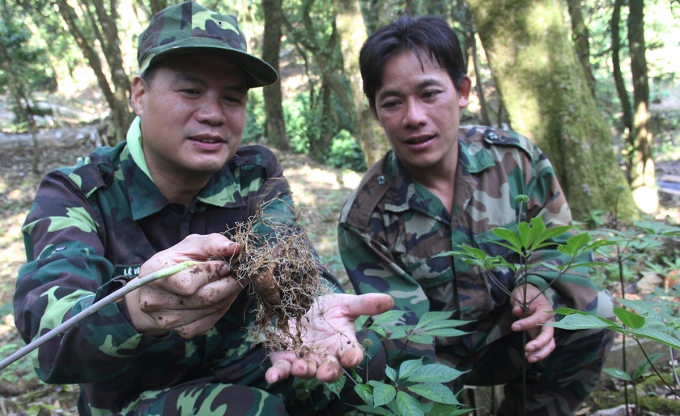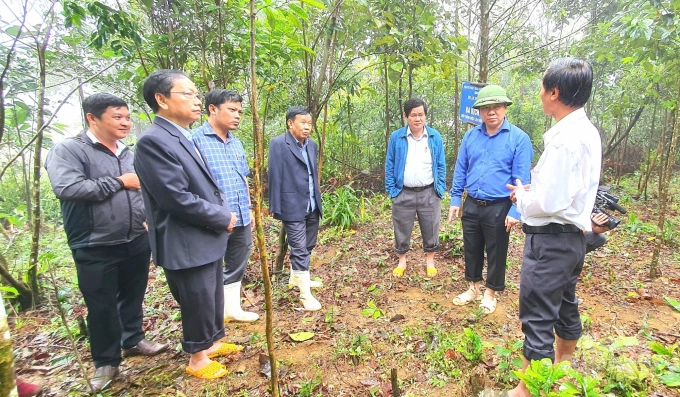May 31, 2025 | 08:18 GMT +7
May 31, 2025 | 08:18 GMT +7
Hotline: 0913.378.918
May 31, 2025 | 08:18 GMT +7
Hotline: 0913.378.918

Vietnamese ginseng (Ngoc Linh gingseng), one of the precious medicinal plants of our country. Photo: TL.
The garden, covering an area of more than 75 hectares, has been set up to minimise dependence on harvested-naturally or imported medicinal plants.
It is believed to be one of solutions to the situation that Viet Nam has over 5,100 plants used for medicinal purposes, however, the country’s medicinal herb gardens only meet 30 per cent of the domestic demand. As a result, Viet Nam now has to import medical herb mainly from China.
According to the company, the content of medicinal substances in medicinal plants in the province is 5-7 per cent higher than the content mentioned in the pharmacopoeia but overexploitation has caused the source of medicinal herbs in the forest exhausted.
The medicinal garden, developed by the company, belongs to a project to grow clean medicinal herbs following the Good Agricultural and Collection Practices – World Health Organisation (GACP-WHO).
Among 20 types of medicinal herbs, the company tested and identified 12 types of medicinal herbs suitable for planting in the local special-use forest in the commune.
Pharmacist Nguyen Duc Thiep, head of the company’s Clean Medicinal Plant Project Management Board said the species that were selected to plant in the garden encompassed Ampelopsis cantoniensis; Anoectochilus setaceus Blume; Paris Polyphylla Sm; Stemona tuberosa Lour; Angelica sinensis; Campanumoea javanica Blume; Morinda officinalis How; Fallopia multiflora; Salvia miltiorrhiza Bunge; Ehretia asperula; Platycodon grandiflorum and Asparagus cochinchinensis.
Thiep said the company successfully developed several tissue-culture processes for medicinal plants, including Campanumoea javanica Blume; Morinda officinalis How; Fallopia multiflora; Salvia miltiorrhiza Bunge and Anoectochilus setaceus Blume.
Besides, the company was also propagating plants from cuttings for Ampelopsis cantoniensis; Schisandra sinensis Baill and Lonicera japonica Thumb, he said.
Currently, four types of medicinal herbs grown by the company had achieved GACP-WHO certification, including Angelica sinensis; Ampelopsis cantoniensis; Gymnema sylvestre and Solanum procumbens Lour, he said.
The company has had over 10 medicinal products and functional foods manufactured from medicinal herbs licensed by the Ministry of Health so far.
Two products, named Dưỡng can BIDIPHAR and Hebamic, were produced from clean medicinal herbs from the garden.
Pham Thi Thanh Huong, General Director of the company said the company grew medicinal herbs to get good ingredients.
Therefore, the company strictly obeyed to the farming process without using growth stimulants, pesticides and preservatives, she said.
When the plants got diseases, the technical staff would save them by changing farming methods first, they would only use biological drugs for the worst case, she said.
Besides, the company was constantly investing in researching and growing medicinal herbs, she said.
Chairman of the People’s Committee of the province Nguyen Phi Long said when he visited the garden that the garden not only helped the company in preparing actively the source of medicinal herbs for production but also opened a new way for agricultural production in the district as well as contributing to improving the efficiency of forest protection in the province.
Long also said that the company had owned a closed production process and got stable output.

Chairman of the People’s Committee of the province Nguyen Phi Long (second, right) visits the medicinal herb garden of Bidiphar in An Toan commune. Photo: Vu Dinh Thung.
This was a premise for the company to expand the project. Then, planting medicinal plants would be a new business direction for the local people in the commune, he added.
The committee was ready to issue mechanisms and policies to support the company to develop the garden into a hub for research and production of medicinal varieties of the province, he said.
Huong, General Director of the company, said the company would continue developing the medicinal herb garden in the future, conducting market research, diversifying products from herbal medicines and functional foods for health protection by using local herbal sources.
We would also continue investing to set up production equipment from preliminary processing to extracting and drying right in the garden this year, she said.

(VAN) Several scientists and farmers are experimenting with soil treatment in some key durian-growing regions such as Cai Lay (Tien Giang), Dak Song, Gia Nghia, and Dak R’lap (Dak Nong).
/2025/05/25/4127-3-073637_820.jpg)
(VAN) Thanks to the promotion from an FAO-implemented project, vegetable production in greenhouses in Moc Chau has seen strong development, from 1.5 hectares in 2021 to nearly 50 hectares in 2024.

(VAN) FAO has recently supported USD 140,000 to implement the project 'Risk mitigation human-animal interface risks through disease control initiatives in pig farming.'

(VAN) The People's Committee of Tra Vinh province has approved an adjustment to the investment policy for the Green Hydrogen Plant project, increasing its area to approximately 52.76 hectares.
![Reducing emissions from rice fields: [2] Farmers’ commitment to the soil](https://t.ex-cdn.com/nongnghiepmoitruong.vn/608w/files/news/2025/05/05/dsc08881jpg-nongnghiep-140632.jpg)
(VAN) Clean rice cultivation model in Thuong Tan commune, Bac Tan Uyen district, is assisting local residents in achieving sustainable agriculture by substantially reducing costs, increasing productivity, and protecting the environment.

(VAN) At the conference to disseminate Resolution No. 68, AgriS introduced its digital agricultural ecosystem and reaffirmed its commitment to accompanying the Government in promoting private sector development and sustainable agriculture.

(VAN) 'Blue Ocean - Blue Foods' initiative is designed to restore marine ecosystems and establish sustainable livelihoods for local communities by cultivating a minimum of 1,000 hectares of cottonii seaweed in the first three years.